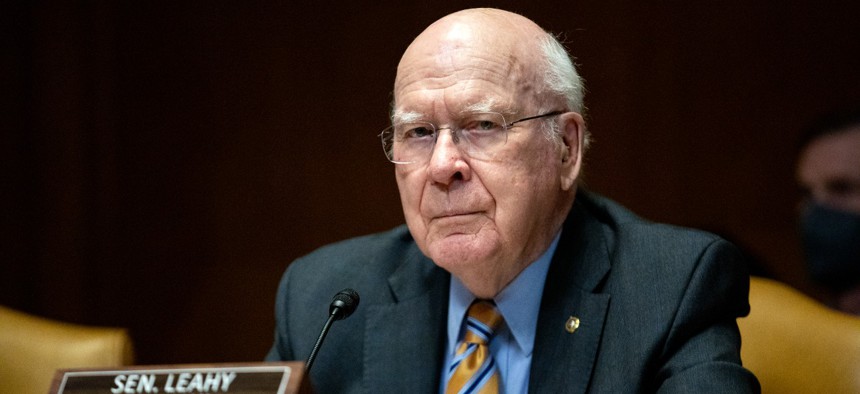
Sen. Patrick Leahy, D-Vt., chairman of the Senate Appropriations Committee, said on the Senate floor Thursday that he and his House counterparts were drafting the measure without “poison pill” riders that Republicans would object to, but Republicans have not expressed a willingness to go along with the plan. Amanda Andrade-Rhoades-Pool/Getty Images
Democrats Threaten Year-Long Stopgap Measure as Spending Talks Remain at a Standstill
Lawmakers concede a long-term CR would devastate agencies, though a bipartisan breakthrough to avoid a shutdown has proven elusive.
Congressional Democrats are threatening to pass a year-long stopgap funding bill that would freeze agency spending at their current levels through fiscal 2023, though lawmakers are calling the plan a “last resort” over fears it would severely hamper federal operations.
Negotiators remain divided on a top-line funding agreement that would set the totals for defense and non-defense spending and allow line-by-line appropriations bills to be written, lawmakers in both parties reiterated on Thursday, leaving an unclear path to avoiding a shutdown when the current continuing resolution expires after Dec. 16. Democrats said they will formally issue their own full-year, omnibus funding package on Monday. As Government Executive reported last week, they are crafting that proposal without Republican support.
While Sen. Patrick Leahy, D-Vt., chairman of the Senate Appropriations Committee, said on the Senate floor Thursday that he and his House counterparts were drafting the measure without “poison pill” riders that Republicans would object to and that it should therefore be able to win at least the 10 requisite votes from that party, Republicans have shown no willingness to go along with the plan. Instead, they have demanded that Democrats lower their overall funding request for domestic agencies. Democrats have sought to increase funding for non-defense agencies to a similar degree as the boost for the Pentagon, while Republicans have said the two sides remain divided on domestic spending by about $25 billion.
House Speaker Nancy Pelosi, D-Calif., said on Thursday if all else fails, she will put forward a bill to extend the current stopgap through Sept. 30, 2023.
“Our strong preference is to have a bipartisan omnibus bill,” Pelosi said. “We still see a pathway to achieving that. However, if we don't have it, we may be forced to put forward a year-long CR. This is a last resort.”
Leahy said his door is open to continue negotiations, but his forthcoming omnibus may be the only train left in the station.
“The alternative will be a continuing resolution, at last year’s levels, with no adjustments for inflation and the real life consequences that entails,” Leahy said. [Republicans] will have no one to blame but themselves.”
The path for a year-long CR is unclear, as Republicans would prefer a shorter-term measure that punts into next year when they take control of the House. Many Democrats would likely be reluctant to give up on funding key domestic and defense priorities. Pelosi conceded the plan would leave many agencies "inadequately funded," but said it would be "preferred to the poison that may befall us" if lawmakers kick the can to January.
If the year-long CR plan fails or dissipates, Democratic aides previously said they would turn to a week-long bill. Lawmakers would hope that they could reach a longer-term solution by what would be the new Dec. 23 deadline, with added pressure of aiming to resolve all end-of-year business before Christmas.
Last week after a meeting at the White House, Senate Minority Leader Mitch McConnell, R-Ky., said there was “widespread agreement” to complete a full-year omnibus before the end of the year. Members of his own caucus, as well as House Minority Leader Kevin McCarthy, R-Calif., and conservatives in the lower chamber, have since ramped up pressure to instead agree only to a short-term CR to keep agencies open into January. McConnell has subsequently said negotiators are running out of time and such an approach may be the only option going forward.
President Biden this week hosted Leahy and Sen. Richard Shelby, R-Ala., the top Republican on the Appropriations panel, to discuss the funding negotiations. White House Press Secretary Karine Jean-Pierre said on Wednesday Office of Management and Budget Director Shalanda Young is representing Biden in the ongoing discussions.
“She knows how to get this done,” Jean-Pierre said, declining to say what length of CR the White House would support. “[Biden] believed that we were able to do this in a bipartisan way last year and we should be able to do that in a bipartisan way this year. We have the time to get that done.”
The White House has already sent a list of “anomalies” that it says would be required to accompany a full-year CR to avoid major disruptions to government programs. Democrats have warned such an outcome would deprive the Veterans Affairs Department of funding to provide expanded benefits from a new law enacted this year, sabotage the bipartisan CHIPS and Science Act that lawmakers passed with great fanfare in July, leave the Federal Aviation Administration with critical air traffic controller staffing shortages, and force Customs and Border Protection to furlough hundreds of officers, among other issues. Defense Department Secretary Lloyd Austin has said a year-long CR would damage a litany of priorities, including recruiting and hiring, research and development, investments in infrastructure and competitiveness with adversaries like China.







